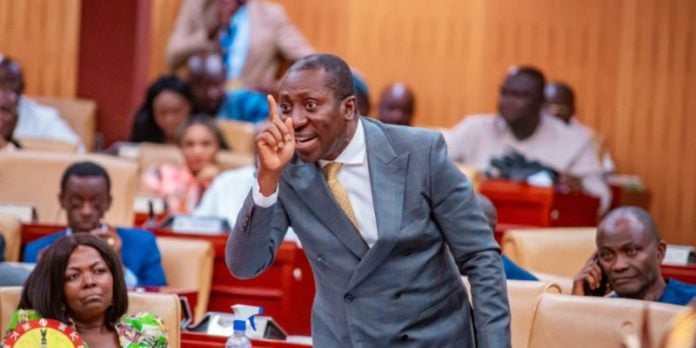The heart of parliamentary democracy lies in its power to scrutinize and influence government actions, a power that is undermined when the executive branch bypasses established protocols of communication. In Ghana, a recent controversy has ignited over the government’s practice of releasing major announcements to the media before informing Parliament. This breach of protocol, according to Minority Leader Alexander Kwamina Afenyo-Markin, disrespects the legislature and compromises its ability to effectively fulfill its constitutional mandate. He argues that Parliament should be the primary recipient of official government communications, especially those requiring parliamentary action or oversight, rather than being treated as an afterthought, receiving information already disseminated through public channels. This practice, he asserts, weakens the very foundation of democratic governance by marginalizing the role of the elected representatives of the people.
Afenyo-Markin’s critique draws on a precedent established during the 8th Parliament under President Akufo-Addo, where the then-Speaker insisted on prioritizing parliamentary communication. This precedent underscored the principle that Parliament, as the embodiment of the people’s will, should be the first to learn about government decisions and policies, not the last. By circumventing this established protocol, the current government, according to Afenyo-Markin, demonstrates a concerning disregard for the legislature’s authority and the democratic principles it represents. This disregard, he contends, sets a dangerous precedent that could further erode the balance of power between the executive and legislative branches, potentially hindering the effectiveness of parliamentary oversight and accountability.
The specific instance that triggered Afenyo-Markin’s strong rebuke was the recent handling of ministerial nominations by President John Dramani Mahama. The Minority Leader expressed his deep displeasure at the news of these nominations reaching the media before Parliament was officially informed. This act, he argued, not only disregarded established protocol but also demonstrated a lack of respect for the institution of Parliament and its members. The nominations, being a matter of significant national importance and requiring parliamentary vetting, should have been first communicated to the House, allowing members to adequately prepare for their constitutional duty of scrutiny and approval.
The release of such crucial information to the media ahead of Parliament, Afenyo-Markin emphasized, undermines the legislature’s role in the democratic process. It denies Parliament the opportunity to engage in informed deliberations and to fulfill its oversight function effectively. This practice effectively renders Parliament reactive rather than proactive, forcing it to respond to information already in the public domain, which could compromise its ability to thoroughly scrutinize and hold the executive accountable. The preemptive release of information to the media, he argued, creates a fait accompli situation, limiting Parliament’s capacity to influence policy and potentially undermining public trust in the institution.
Afenyo-Markin’s concerns extend beyond the immediate issue of ministerial nominations to a larger pattern of government behavior that marginalizes Parliament. He called upon the executive branch, particularly Acting Spokesperson Felix Ofosu Kwakye, to demonstrate greater respect for Parliament and adhere to established protocols of communication. The consistent bypassing of Parliament, he warned, could lead to a weakening of democratic institutions and a potential imbalance of power, with the executive branch accumulating undue influence over the legislative process. This imbalance, he argues, would be detrimental to the principles of good governance and accountability that are essential for a healthy democracy.
In conclusion, Afenyo-Markin’s criticism highlights a fundamental tension within a democratic system: the balance of power between the executive and legislative branches. His appeal for respect for parliamentary protocol is not simply a matter of procedural correctness but a defense of the very essence of parliamentary democracy. The practice of prioritizing media announcements over parliamentary communication, he argues, not only disrespects the legislature but also undermines its critical role in holding the government accountable and ensuring that decisions are made in the best interest of the people. The precedent set by such actions, he warns, could have long-term implications for the health and effectiveness of Ghana’s democratic institutions.














